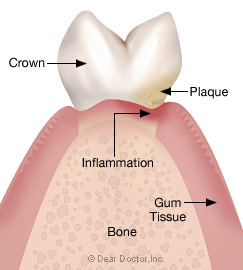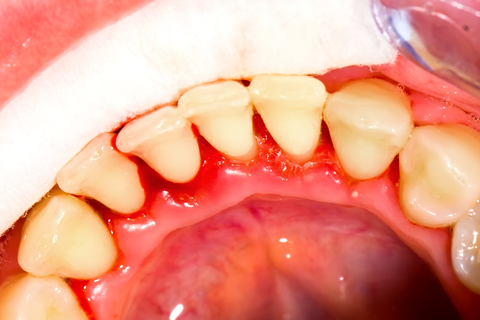
Although gingivitis is a fairly common condition, it doesn’t necessarily mean you’ll have to deal with it. In fact, almost 80% of adults will experience some form of it during their lifetime. And while it doesn’t have to be an imminent disease, it is important to recognize the symptoms of gingivitis in order to get proper treatment. Fortunately, there are many ways to detect gingivitis and prevent it from getting worse.
The short-term effects of plaque buildup on your teeth are the main cause of gingivitis. Plaque is a combination of bacteria, food residue, and saliva. If left untreated, plaque can turn into tartar, which gets stuck at the base of your teeth along the gum line. This irritates your gums, and it produces bacteria and toxins. This results in gum inflammation. While this is generally a non-life-threatening condition, you should seek professional care if you develop any of these signs.
Gingivitis is a symptom of a more serious condition. In some cases, it can be a symptom of an underlying illness. In some cases, it can be rheumatoid arthritis or periodontitis. In other cases, patients with this condition may develop ulcers on their gums, which require a medical diagnosis. If your gums are bleeding or are swollen, you may have gingivitis.
There are several different ways to treat gingivitis. One of the best ways to do so is to visit a dentist regularly. A proper cleaning is essential for treating and preventing gingivitis. Brushing and flossing properly is important in order to remove plaque and prevent further damage to your gums. And don’t forget to visit your dentist at least twice a year. If you’re experiencing symptoms of gingivitis, it’s important to schedule an appointment as soon as possible.
People with gingivitis likely have high levels of bacteria in their mouth. People with high levels of these bacteria are more likely to develop gingivitis than healthy people. They are also more likely to experience symptoms of this disease if they smoke and do not floss regularly. Your dentist can also help you determine if you are at risk for gingivitis by examining your gums and teeth.
Although the underlying cause of gingivitis is unknown, the infection can develop into a more aggressive form known as periodontitis. This type of gingivitis can be dangerous and lead to complications such as cardiovascular and respiratory diseases. Site CTH can help you manage the symptoms of gingivitis and recommend appropriate treatment for your case. And if you’re already experiencing severe symptoms, you may need to see a dentist.

To prevent gingivitis, you should take good care of your teeth and gums. Be sure to visit your dentist twice a year for cleanings. During this time, your dentist will evaluate your oral health and recommend a specific treatment regimen. This will help you avoid illness or at least minimize it. If you have sensitive gums, your dentist will recommend a special toothpaste.
Other causes of gingivitis include dry mouth, smoking and poor oral care. Acute gingivitis is not life-threatening, but requires immediate treatment. For example, you can use chamomile tea or apple cider vinegar water as a mouth rinse. If symptoms of gingivitis persist, you should contact your dentist. In addition to brushing your teeth, you should use anti-gingivitis toothpaste, which helps remove plaque. This toothpaste is clinically proven to promote gum health.
There are many other factors that contribute to the development of gingivitis. The most common of these is poor oral hygiene. If you don’t brush and floss regularly, you may develop gingivitis. Additionally, you may also experience toothache and misaligned teeth. The good news is that gingivitis is treatable. Fortunately, this condition is usually treatable. The most important stage in the treatment of gingivitis
is the removal of plaque. You can easily do this at home, but if you need to visit a dentist, you can use special tools for this.
You should visit your dentist if you suspect you have gingivitis. Early treatment of gingivitis is vital to repair any damage to the teeth and gums. And don’t forget about the health of your teeth! Don’t wait until it’s too late to make an appointment with your dentist! Once you discover the symptoms, you can choose the best treatment for your condition.